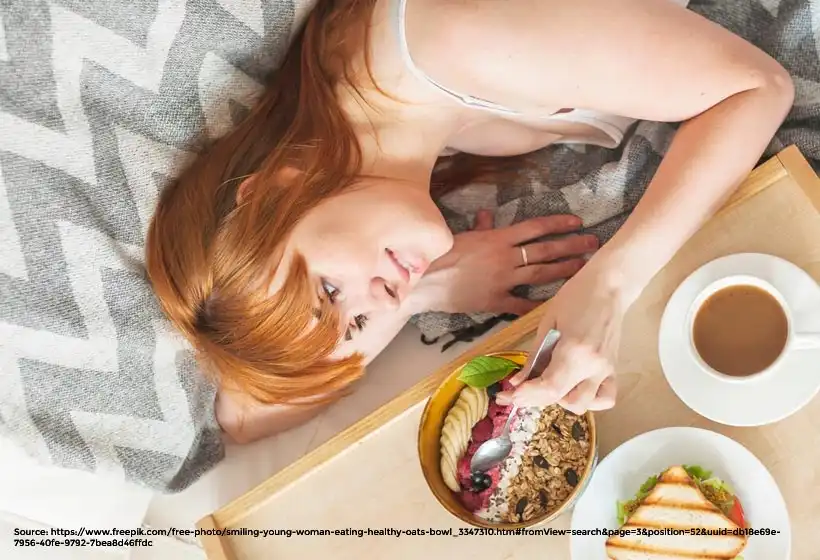Can Lack of Protein Affect Sleep? Know the Truth!

How do our daily habits impact sleep? This question always comes to my mind.
Sleep has become an important topic in recent years. As per the data of 2022, about 36.8 percent of United States adults reported not getting enough sleep. Many of us struggle with sleep issues. However, we often overlook our diet. Protein intake plays a role in this.
I’ve noticed that most people focus on stress or screen time. Have you ever thought of protein as the hidden culprit?
Let’s explore the truth and find out!
Below you will find what happens to your sleep when your body is low in protein:
What Happens When Your Body Is Low in Protein?
- Low protein levels can affect serotonin production. It acts as a neurotransmitter essential for regulating sleep.
- Without enough serotonin, you may struggle to fall asleep easily.
- Protein deficiencies can cause imbalances in blood sugar levels.
- It leads to frequent awakenings during the night as your body struggles to regulate energy.
- Without adequate protein, your body might not produce enough amino acids.
- It includes tryptophan, which is essential for restful and deep sleep.
- Low protein intake can lead to muscle weakness and fatigue.
- It can affect your energy levels throughout the day. This makes you feel more tired despite a full night’s sleep.
- Protein helps maintain hormonal balance. It includes melatonin production, which regulates your circadian rhythm.
- A lack of protein can throw off this balance, leading to disrupted sleep patterns.
- Inadequate protein can lead to muscle cramps or discomfort during sleep.
- It results in restlessness and an inability to stay comfortable throughout the night.
Hence, by ensuring sufficient protein in your diet, you can improve your sleep quality and enjoy more restful nights.
I’ve always been interested in how diet impacts sleep. If you want to know how a low-carb diet affects your sleep, read on!
Let’s break down some key points.
Low-Carb Diet and Sleep Problems

Blood Sugar Spikes After Poor Sleep:
- After a bad sleep, your blood sugar can spike after eating.
- This may leave you feeling sluggish throughout the day.
- It makes it harder to regulate energy levels.
Sleep Deprivation and Increased Calorie Intake:
- When people are sleep-deprived, they tend to consume more calories.
- The body craves quick energy sources like carbs, especially when running on limited sleep.
- This can result in overeating and making poor dietary choices.
Links Between Sleep and Carbs:
- Food intake does influence sleep.
- Whether it’s reaching for snacks due to sleep deprivation or carbs directly affecting sleep quality.
- The connection is undeniable.
Not All Carbs Are the Same:
- Carbohydrates come in various forms, ranging from healthy fiber to refined sugars.
- Complex carbs, found in whole grains and vegetables, are beneficial for digestion and energy. Refined carbs, like those in sodas and processed foods, can cause blood sugar spikes and lead to sleep disruptions.
Carbs and Disrupted Sleep:
- A diet high in saturated fat and low in fiber caused participants to experience lighter sleep.
- Higher sugar intake led to more frequent awakenings throughout the night.
- It indicates that carbs, especially the wrong kind can disrupt sleep.
Low-Carb Diets and REM Sleep:
- Low-carb diets can reduce the amount of REM (dream) sleep, while increasing deep, slow-wave sleep.
- Low-carb diets like keto may alter sleep patterns, but the long-term effects on health remain unclear.
Carbs and Insomnia:
- Diets high in refined carbs were associated with a greater likelihood of insomnia.
- In contrast, diets rich in fiber, fruits, and vegetables were linked to reduced insomnia symptoms.
Can Carbs Make You Sleepy?
Certain carbs can promote sleepiness. A large carbohydrate dose before bed reduced night-time awakenings. It increases REM sleep.
Knowing how your body responds to carbs is important. It could be key to improving your sleep quality.
Did you know sleep and nutrition are correlated?
Sleep Nutrition Facts
Studies have found that when we eat late at night, there is a change in our gut microbiome.
- This is something researchers have noticed in shift workers. They eat most of their calories during nighttime hours.
- These changes are often linked to a disruption in the body’s natural clock. In return, it led to poor sleep.
- Not getting enough sleep, less than 7 hours a night? It’s common to make poor food choices.
- According to research, people who sleep less tend to eat more calories.
- They often have lower protein and fiber intake. It’s a way sleep and nutrition are closely connected!
Another research has found that there is a connection between the carbs we eat and how well we sleep.
- It turns out that food rich in tryptophan, melatonin, and serotonin can significantly improve sleep quality.
- For adults, eating these kinds of foods has been shown to lead to longer downtime.
- This leads to better performance during the day and an overall increase in total sleep time.
- What’s more, vitamins and minerals—like B vitamins and zinc—play a key role.
- It shows how well we sleep. When people who were deficient in these nutrients started getting enough, their sleep quality improved noticeably.
- This shows how much our diet can impact our rest.
Sleep-related issues are a complex topic. There’s still a lot we don’t fully understand. When it comes to the connection between sleep and diet, the research is ongoing. It can vary from person to person.
Let us look at some of the foods to eat before bed. It can help you to struggle with anxiety and insomnia.
Diet For Insomnia and Anxiety Before Bed

1. Almonds
- Almonds are packed with nutrients.
- It is known to help reduce the risk of diseases like type 2 diabetes and heart disease.
- Almond improves sleep quality because they contain vitamin B and magnesium.
- It helps regulate your sleep-wake cycle.
- Almond extract can help with longer, deeper sleep.
2. Chamomile Tea
- Chamomile tea is a well-known herbal tea.
- It provides several health benefits. The tea improves sleep quality.
- It’s rich in antioxidants. This includes flavones, which help reduce inflammation.
- It may lower the risk of chronic diseases. It can be cancer or heart disease.
- Chamomile tea also contains apigenin. It is an antioxidant. Chamomile tea binds to receptors in the brain to promote sleepiness. It reduces insomnia.
3. Kiwi
- Kiwis are not only nutritious but also low in calories. It makes them a great bedtime snack.
- They can benefit digestive health, and reduce inflammation.
- Kiwis are also rich in serotonin, a brain chemical that regulates sleep.
- Their anti-inflammatory antioxidants, like vitamin C, may contribute to better sleep.
4. Tart Cherry Juice
- Tart cherry juice is a nutrient-rich drink.
- It contains magnesium, phosphorus, and potassium.
- It’s also loaded with antioxidants and melatonin, which is known to promote sleepiness.
- Hence, drinking tart cherry juice before bed can improve sleep quality and may even help with insomnia.
What is the link between sleep and anxiety? Read on!
Now, you can understand why proper nutrition is necessary for your sleep. When your body is low in protein, you may experience fatigue. This can disrupt your sleep cycle. A low-carb diet can further complicate sleep.
It’s time to put your health first. Sweet dreams start with smart choices!
FAQs on Nutrition and Sleep
- What happens if you don’t eat enough protein?
If your body doesn’t get enough protein, you might notice signs like swelling (edema), hair loss, increased hunger, and a higher risk of infections. Protein is crucial as it supports the building and repair of muscles. It is one of the key nutrients for overall body function.
- Can low protein intake lead to sleep problems?
Yes, low protein intake can affect sleep quality. Diets low in protein are linked to a reduction in slow-wave sleep. However, total sleep time remains largely unaffected, Nonetheless, ensuring balanced protein levels in your diet may help improve the quality of your sleep.
- Which nutrients are best for improving sleep?
Fiber-rich foods like beans and oatmeal can improve sleep. Protein sources high in tryptophan, such as poultry, are linked to better sleep quality. Key nutrients that promote good sleep include magnesium and vitamin D. It also includes iron, omega-3 fatty acids, and manganese.
- What high-protein foods promote better sleep?
Lean proteins like low-fat cheese, chicken, turkey, and fish are good options. They are rich in tryptophan, an amino acid that boosts serotonin levels and aids sleep. You can also find tryptophan in foods like egg whites, soybeans, and pumpkin seeds. Adding these to your diet can help promote restful sleep.
- What type of protein is best for promoting sleep?
Casein protein is found in protein powders and low-fat dairy products. It is a good choice for a late-night snack. Studies suggest that consuming casein before bed is more beneficial. It’s digested and absorbed more slowly, providing a steady release of nutrients throughout the night.
